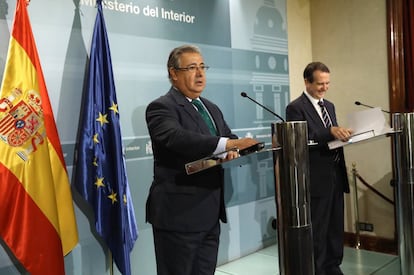Spanish cities fail to apply national plan against Islamic radicalization
Just 13 out of 8,000 municipalities in Spain have implemented Interior Ministry scheme


Even before the terrorist attacks of Barcelona and Cambrils earlier this month by young men who had been indoctrinated by a radical imam, the Spanish Interior Ministry had already developed a plan to combat the problem, but so far its guidelines have barely been implemented by local officials.
In January 2015, the ministry presented its National Strategic Plan to Fight Violent Radicalization, including all forms of extremist thought. The project was based on coordination between local groups that would answer to municipal authorities, sharing information about individuals at risk of being targeted by, among others, jihadist recruiters.
It’s each man for himself, there is no sharing of anything
Counter-terrorism official
The plan involved social workers, schools, local police officers, courthouses and civic associations. But so far, only 13 out of Spain’s 8,000 towns and cities have effectively implemented the plan.
Of these, only Málaga has openly recognized its involvement. “Madrid is in there as well, for instance, but they [local authorities] generally prefer not to show up because it implies admitting that they have a problem with a specific community, and they want to avoid criticism over xenophobia or criminalization,” say officials in charge of the plan.
Meanwhile, Catalonia and the Basque Country have launched their own anti-radicalization plans “without any kind of coordination,” say national counter-terrorism sources. The national plan establishes “mandatory cooperation between national and regional law enforcement agencies in cases whose complexity exceeds a local or provincial treatment.”
No information-sharing
Just hours after the attacks in Catalonia, when photographs of the suspects began to circulate, two people recognized the suspects almost immediately: a high school teacher and a community worker from Ripoll, the small town in Catalonia where the men involved in the attacks all came from.
The social worker wrote an open letter published by EL PAÍS, titled “How can it be Younes?”, expressing her shock at what her “kids from Ripoll” had done. Their school teacher noted that some of the members of the terrorist cell had dropped out of school a year ago. But the teacher and the community worker had never had a chance to exchange their opinions about the young men.
Municipalities prefer not to show up because it implies admitting that they have a problem with a specific community
National Plan official
“It’s each man for himself, there is no sharing of anything,” says a high-ranking official who works in counter-terrorism. The interior ministry plan, which was drafted by the Intelligence Center Against Terrorism and Organized Crime (CITCO), “is eminently social in nature and follows the prevention guidelines necessary to fight jihadism; it seeks to coordinate all stakeholders to detect sources of radicalization,” says the same source.
But two and a half years after it was introduced, the plan has only been adopted by 13 municipalities in Spain, say counter-terrorism sources. “They were selected because of their problematic situation; deals were reached with local governments of various political stripes and sizes,” notes one of the people in charge of the plan.
No political will
High-ranking counter-terrorism officials blame the inertia on “a lack of political will, because anything involving coordination between administrations in this country seems doomed to fail.”
The same experts also underscore that this is not a funding issue, because the plan is about coordinating human and material resources already budgeted for, along with creating corresponding departments in municipal governments that should report back to a National Group – made up of representatives from 12 ministries, the police, the Civil Guard and others. There is, however, a technical issue that does require financial support: “We need to create software to collect and share the information.”
English version by Susana Urra.
Tu suscripción se está usando en otro dispositivo
¿Quieres añadir otro usuario a tu suscripción?
Si continúas leyendo en este dispositivo, no se podrá leer en el otro.
FlechaTu suscripción se está usando en otro dispositivo y solo puedes acceder a EL PAÍS desde un dispositivo a la vez.
Si quieres compartir tu cuenta, cambia tu suscripción a la modalidad Premium, así podrás añadir otro usuario. Cada uno accederá con su propia cuenta de email, lo que os permitirá personalizar vuestra experiencia en EL PAÍS.
¿Tienes una suscripción de empresa? Accede aquí para contratar más cuentas.
En el caso de no saber quién está usando tu cuenta, te recomendamos cambiar tu contraseña aquí.
Si decides continuar compartiendo tu cuenta, este mensaje se mostrará en tu dispositivo y en el de la otra persona que está usando tu cuenta de forma indefinida, afectando a tu experiencia de lectura. Puedes consultar aquí los términos y condiciones de la suscripción digital.








































